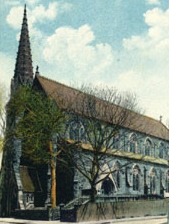Colony House $5 General Admission, $1 NHS members
New England was inhospitable territory for Catholics from the colonial era until the Civil War. In colonial Massachusetts priests who entered the territory would be subject to imprisonment. In the nineteenth century, a Jesuit was tarred and feathered in Maine, a convent near Boston was torched, and another nuns’ residence in Providence narrowly escaped attack. Newport, by contrast, accepted Catholics just as it had accepted Jews, Quakers and Baptists before them. Dr. Quinn will explain how, from 1780 when French troops landed in Newport to aid with the Revolutionary War, through the following decades when the Irish settled, Newport proved to be an oasis of tolerance for Catholics in New England.
John F. Quinn is Professor of History at Salve Regina University, where he has taught since 1992. He specializes in Irish and Irish-American History. His publications include Father Mathew’s Crusade: Temperance in Nineteenth-Century Ireland and Irish America (University of Massachusetts Press, 2002) and articles in the New England Quarterly, the Catholic Historical Review, the Pennsylvania Magazine of History and Biography and the Newport Historical Society’s journal Newport History.
